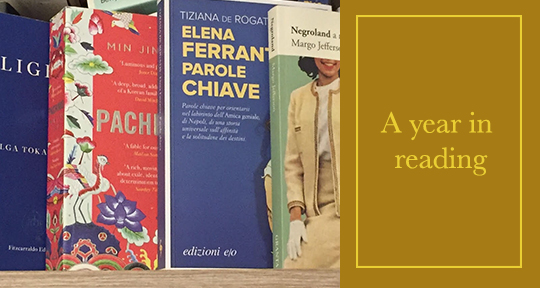This week, our editors from around the globe are bringing news concerning the pressing issues of our time, from literature and its manifold intersections. From Ukraine, writers are publishing pertinent and vivid texts within the throes of war. In India, the Jaipur Literary Festival boasts an impressive line-up, including most recent Nobel laureate Abdulrazak Gurnah. In Hong Kong, the prestigious Liang Shih-chiu Literature Prize announces its winners. Read on to find out more!
Kristina Tatarian, Editor-at-Large, reporting for Ukraine
Nominated by the Polish Institute of Sciences, one of the most promising young writers in Ukraine, Serhiy Zhadan, is in this year’s runner-up list for the Nobel Prize in Literature. Among his most notable works is The Orphanage, a novel about the war in Ukraine translated by Reilly Costigan-Humes and Isaac Stackhouse Wheeler.
Reinforced by the international community, many Ukrainian writers have been extremely prolific, having emotive, cool-headed reads published in the international press; certain autofictional pieces provide the public with crucial information while relegating to the outside world the feelings of our own. Among them is the war diary of Yuliya Iliukha from Kharkiv—authentic, full of bitterness, hatred, and a sense of impotence; the Kyiv chronicle by Oleksandr Mykhed, translated by Marina Gibson, starts with a tentative description of his unfinished first play, interrupted by the start of the war; a letter from Kyiv by Luyba Yakimchuk, translated by Jennifer Croft, tells us about the power of language to turn into a gunshot.
TAULT, with Zenia Tompkins as its head, has encouraged the war efforts of Ukrainian writers who have laid down their pens and joined the fight for freedom. In the words of TAULT’s associate director Kate Tsurkan, literary translators and writers around the world must join the global translating efforts to “elevate Ukrainian voices right now.” This urgency is felt in the recent publications of Ukrainian literature. Stanislaw Aseyev’s In Isolation—for which he was imprisoned and tortured—speaks about the influence of propaganda in eastern Ukraine, as well as how the place and its people have transformed after the invasion. Another notable work is Larysa Denysenko’s new children’s novel Maya and Her Friends, published in the UK. It is a philanthropic and literary statement about how war ends or cripples our future—an urgent appeal with the “weapon of words” to the international community. In the darkest times like these, it is these kinds of stories we tell our children that have the power to discredit the malignant justifications of evil—for good. READ MORE…



